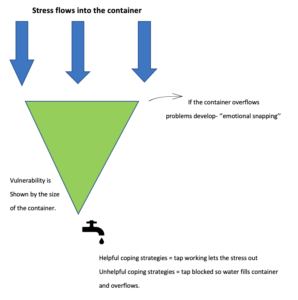Mental Health Awareness Week – Ridley & Hall Solicitors
During Mental Health Awareness week myself Laura and Abbie aim to raise awareness on a range of subjects which may impact on a persons ability to maintain good mental health.
To start with why mental health? Good mental health is as important as good physical health and whilst many of us will spend time and money maintaining our physical health we often neglect our mental health until our mind and or body can no longer cope.
What influences mental health?
Many things may contribute to the development of mental health issues. A key one being STRESS.
External stress and individual vulnerability can combine to lead to the development of mental ill health and mental illness.
Sources of stress:
- Physical stress- late nights, binge drinking, illicit drug use lack of routine, poor diet and illness.
- Environmental stress– poor housing, social isolation, unemployment, new environments
- Emotional stress– relationship problems, peer pressure, high emotions in the family home, leaving home, marriage.
- Acute life events-bereavements, physical illness/accidents, arrest/imprisonment, fights, pregnancy, childbirth, rape, assault.
- Chronic stress- accommodation problems, debts, prolonged use of drugs/alcohol.
What makes one person more vulnerable than another and what can we do about it?
- Genetics– studies show that one aspects of vulnerability is related to their genetic make-up. However, this is not the whole story.
- Coping style-some methods of coping are more effective than others. People who use effective coping methods seem better able to deal with stress than those who don’t.
- Thinking style– How people think about themselves and the world around them seems to make a major difference to their level of vulnerability to stress. Certain more positive thinking methods seem to help some people cope better than others.
- Environment- The way a person deals with stress and the options they have are often related to their environment. Anything from the state of a persons home or the neighbourhood they live in can make a difference.
- Social skills– The better a persons social skills the easier it is for them to get others to help them when things get tough for them to handle alone. People with lots of supportive friends seem to do better in a crisis than people with fewer or no other people to turn to.
So what can we do about it?
There is little that can be done to alter a person’s genetic make-up and there is evidence to show that genes which make a person susceptible to stress are also involved in making them talented in other ways!
Help probably lies in in people examining other factors which make them vulnerable and looking for positive ways to change them. Such as adopting different styles of coping and thinking. Developing social skills can be tricky but is possible, as is making positive changes to a person’s environment.
The Stress Container
The level of vulnerability a person carries is represented by the size of the container into which everyday stresses flow.
The lower a person’s vulnerability to stress the bigger their container is.
The size of the container is down to a lot of factors including difficult experiences such as being bullied or abused as a child. The more difficult the issues the smaller the container is likely to be.
The smaller the container the more quickly it will overflow, and difficulties develop.
Helpful coping methods such as making time for positive valued experiences, getting adequate rest, and asking for help from others can function as a tap to help release stress.
On the other hand unhelpful coping methods, working excessively long hours, self medicating with drugs/alcohol and not getting enough sleep can be additional stressors and fill the container up or block the tap.

Tracey Armitage – HR Manager